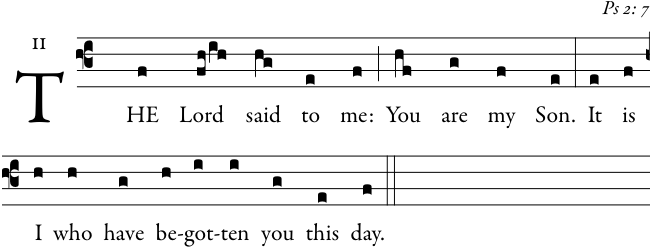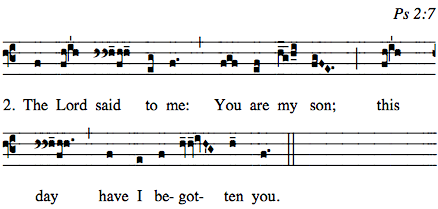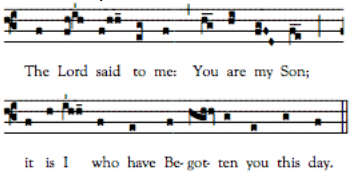Dominus Dixit in English
-
One of things I have learned over the past few years while working on a Dutch adaptation of the Graduale Simplex, is that when you are setting vernacular texts to Gregorian chant melodies, it's best not to try to use every note of the original antiphon, but instead to get inspiration from the mode and flow of the melody and compose something entirely new that fits the text well.
See for instance these three exquisite examples by Adam Bartlett (Lumen Christi Simple Gradual) and Fr. Columba Kelly (Saint Meinrad Archabbey).
(Adam Bartlett)
(Columba Kelly, old Missal translation)
(Columba Kelly, new Missal translation)
These compositions all clearly draw from Dominus dixit, but they use the musical material found in the antiphon and the characteristics of mode II to give expression to the English text, so that the words and syllables that should be accented for theological or linguistic reasons get due emphasis and articulation.
This way the text is sung and heard with understanding, so that the Word may "fall on rich soil, and produce fruit" (Cf. Mt 13: 8). -
The original is so transcendently beautiful! Do it in Latin.
I'm not ashamed to admit that the first time I heard it, I was reduced to tears.
https://www.youtube.com/watch?v=Sg8CQ7Klcds -
I have said before that one of the problems I have with the Palmer-Burgess books is that they are too slavish to the Music, often resulting in poor-sounding English, with texts like "The Lord hath said unto me: My Son thou art; I, it is, who this day hath begotten thee." (Not actually what P-B has for this antiphon, BTW, but an example of some of the problems that occur in these books.) It was almost as if Palmer and Burgess forgot that Chant is a synthesis of text and music, not merely music with a text added. It reminds me of the awful (in the modern sense) singing "translations" fitted to things like Mozart's Ave Verum.
-
Fourth.
-
@brndurham It wasn't a bad idea! Pope Pius X already taught that "the more closely a composition for church approaches in its movement, inspiration and savor the Gregorian form, the more sacred and liturgical it becomes" (Tra le Sollecitudini 28). It's about the way we achieve this for vernacular texts, and the comments above were aimed to help you with this.
-
No! It was not a bad idea! Keep trying things, and learning! Some of the first things I did like that were pretty bad, and now, they are pretty decent! Please feel welcome to continue to post, then look at the comments and try and improve it. They will probably be bad at first, just like most of ours were. Just keep playing with them and trying to improve your skills.Thanked by 1smvanroode
-
Yes, I remember how I sat down with the Dutch master of vernacular chant, Nico Wesselingh, and showed him some of my first compositions. I was convinced they were excellent, because I put a lot of time and effort in them. They sounded right to me.
And already after glancing over the first antiphon he asked me in disbelief: "Why did you put a clivis over this word? It shouldn't get any emphasis in the sentence." And off the cuff he sang a much improved version of my antiphon.
... I learned a lot that day!Thanked by 1CHGiffen
Welcome to the MusicaSacra Forum!
To participate in the discussions on Catholic church music, sign in or register as a forum member, The forum is a project of the Church Music Association of America.
Categories
- All Discussions21,259
- General Music Discussion8,287
- Job Openings212
- Management of Music Programs852
- Choral Matters534
- Church Documents and Rubrics528
- CMAA Notes304
- Events730
- For Newcomers: Read First26
- Sacred Polyphony547
- Hymnody875
- Gregorian Chant: General2,707
- ↳ Graduale Romanum and Liber Usualis369
- ↳ Graduale Simplex60
- ↳ Semiology63
- Vernacular Plainsong697
- Anglican Use and Anglican Chant68
- Organ, Other Instruments and Repertoire438
- New Composition/Works in Progress1,302
- Recordings234
- Music for Hispanic Ministry162
- Music Education: Children213
- Music Education: General222
- News Items245
- Positions Wanted3
- General Discussion: Catholicism740
- Amusements178
- General Discussion1,036
- Opinions119





